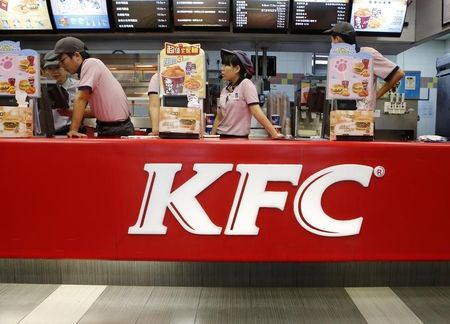By Lisa Baertlein and Nandita Bose
(Reuters) - Yum Brands Inc on Wednesday said its KFC business bounced back in China, its No. 1 market, but its stock fell more than 2 percent in extended-hours trading on disappointing quarterly results from its India, Taco Bell and Pizza Hut divisions.
Yum's sales at established restaurants in China increased 15 percent in the second quarter, including a 21 percent jump at KFC and flat results at Pizza Hut Casual Dining.
Analysts polled by Consensus Metrix had forecast that Yum's China sales would climb 11.4 percent.
An avian flu outbreak and a food-safety scare last year battered Yum's restaurant results in China, which contributes more than half of the company's overall sales. Yum's China division same-restaurant sales tumbled 20 percent in the second quarter last year.
Yum recently revamped its KFC China product lineup to attract more diners.
Yum's China Division, which had 6,387 mostly KFC restaurants at the end of the second quarter, contributed 35 percent of the company's total operating profit last year.
The India division's same-restaurant sales fell 2 percent, versus the 1.6 percent gain that analysts expected.
Yum is not alone. Jubilant Foodworks Ltd, which operates Domino's Pizza Inc restaurants in India, saw same-store sales growth slow sharply to 1.6 percent in the fiscal year that ended March 31 from 16.2 percent a year ago.
Jubilant blamed the slowdown on the "overall strenuous macro-economic situation" and a drop in discretionary spending.
The company has yet to report its June-quarter earnings, but analysts say growth in the fast food sector as a whole is unlikely to pick up before at least another nine months as India's newly elected government tries to kick start an economy that is battling the longest spell of below 5 percent growth in quarter of a century.
"Consumer sentiment has not shown any signs of improvement," said Saloni Nangia, president at retail consultancy Technopak.
"The expectations were that post-elections it will improve but that hasn't happened," she added. Prime Minister Narendra Modi won May elections with a pledge to revive Asia's third-largest economy.
Fast food in India is largely a middle-class luxury. Both Yum and Jubliant are rapidly expanding their store network, anticipating an increase in the number of more affluent Indians in the next few years. The fast food restaurant market is set to triple in 2018 from $1 billion last year, Technopak said.
Yum has been in India for more than a decade. It had 714 total units in the country at the end of the second quarter, including KFC, Pizza Hut and Taco Bell restaurants.
India is a competitive environment and Yum is "investing aggressively" in that market, spokesman Jonathan Blum told Reuters.
Same-restaurant sales were up 2 percent for Taco Bell and down 3 percent for Pizza Hut. Analysts polled by Consensus Metrix expected a 3.6 percent gain for Taco Bell and a 0.1 percent rise for Pizza Hut.
Chief Executive Officer David Novak said the company was pleased with initial results from Taco Bell's breakfast launch in the United States, adding that it was working to improve results at Pizza Hut. "We are taking significant actions in our U.S. (Pizza Hut) business to reignite sales and expect to make substantial progress" for the rest of the year, Novak said in a statement.
Louisville, Kentucky-based Yum also reported net income of $334 million, or 73 cents per share, for the second quarter that ended June 14, compared with $281 million, or 61 cents per share, a year earlier.
The company, which will hold a conference call with financial analysts on Thursday morning, said it is on its way to hitting its forecast of full-year earnings-per-share growth of at least 20 percent.

Yum's stock fell 2.3 percent to $80.81 in after-hours trading on Wednesday, but it remains near its 52-week high.
(Reporting by Lisa Baertlein in Los Angeles and Nandita Bose in MUMBAI; Editing by Jan Paschal and Miral Fahmy)
